Taxation Law: Income, Deductions, and Case Law Analysis - Year 2018
VerifiedAdded on 2023/04/25
|12
|2786
|487
Case Study
AI Summary
This case study provides a comprehensive analysis of taxation law, focusing on income assessment and allowable deductions. Part A involves calculating Jane's net income for the year ended June 30, 2018, considering various income sources like salary, bonuses, awards, rental income, and dividends, as well as deductible expenses related to her business and investments. The analysis also covers statutory income, franking credits, and capital gains/losses. Part B examines the case of FC of T v Cook and Sherden, discussing the facts, decision, and relevance of the case today, particularly concerning non-cash business benefits and their taxability. The study concludes with a detailed computation of Jane's net income, allowable deductions, and taxable income, including calculations for tax payable, Medicare levy, and franking credits.
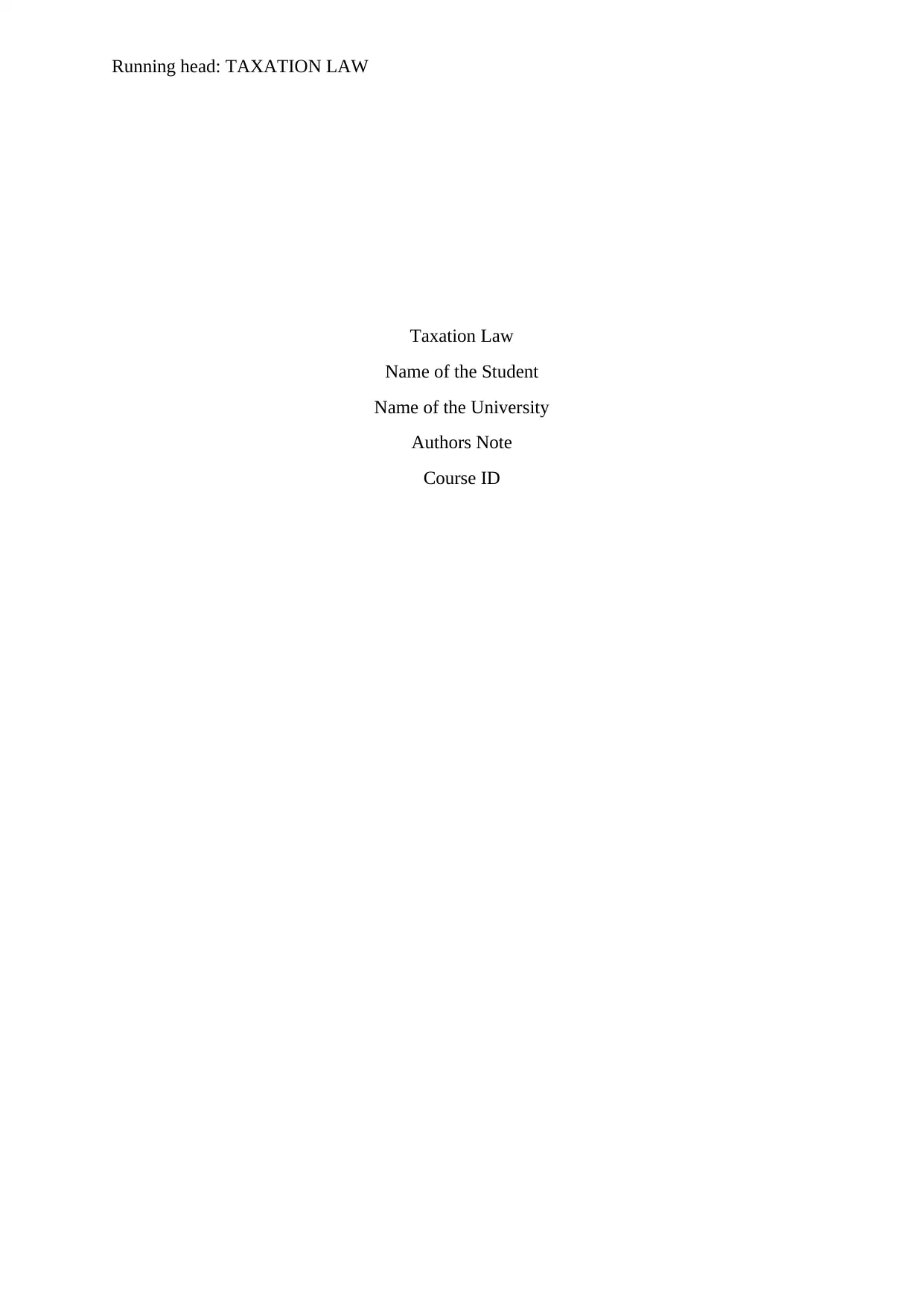
Running head: TAXATION LAW
Taxation Law
Name of the Student
Name of the University
Authors Note
Course ID
Taxation Law
Name of the Student
Name of the University
Authors Note
Course ID
Paraphrase This Document
Need a fresh take? Get an instant paraphrase of this document with our AI Paraphraser
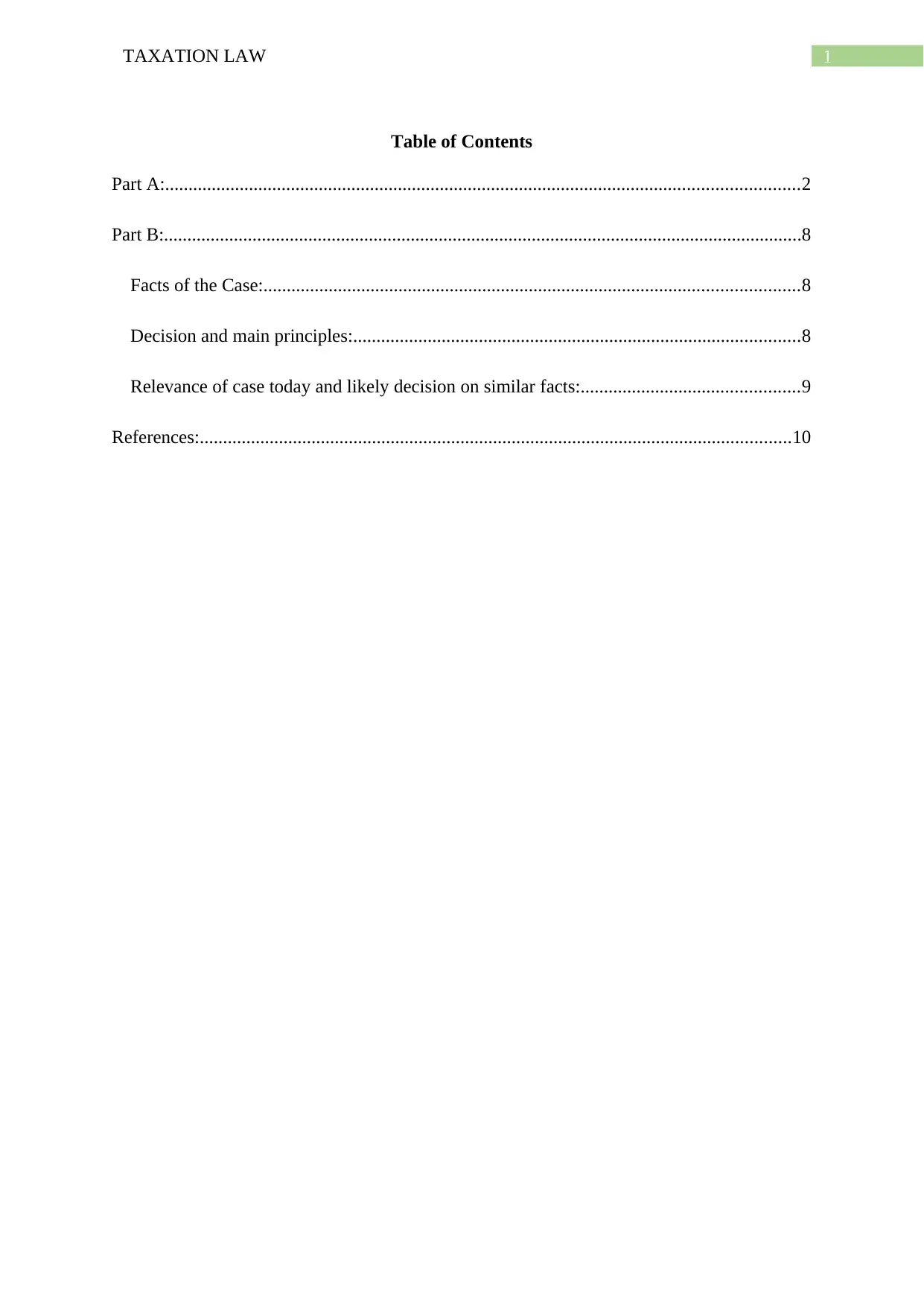
1TAXATION LAW
Table of Contents
Part A:........................................................................................................................................2
Part B:.........................................................................................................................................8
Facts of the Case:...................................................................................................................8
Decision and main principles:................................................................................................8
Relevance of case today and likely decision on similar facts:...............................................9
References:...............................................................................................................................10
Table of Contents
Part A:........................................................................................................................................2
Part B:.........................................................................................................................................8
Facts of the Case:...................................................................................................................8
Decision and main principles:................................................................................................8
Relevance of case today and likely decision on similar facts:...............................................9
References:...............................................................................................................................10
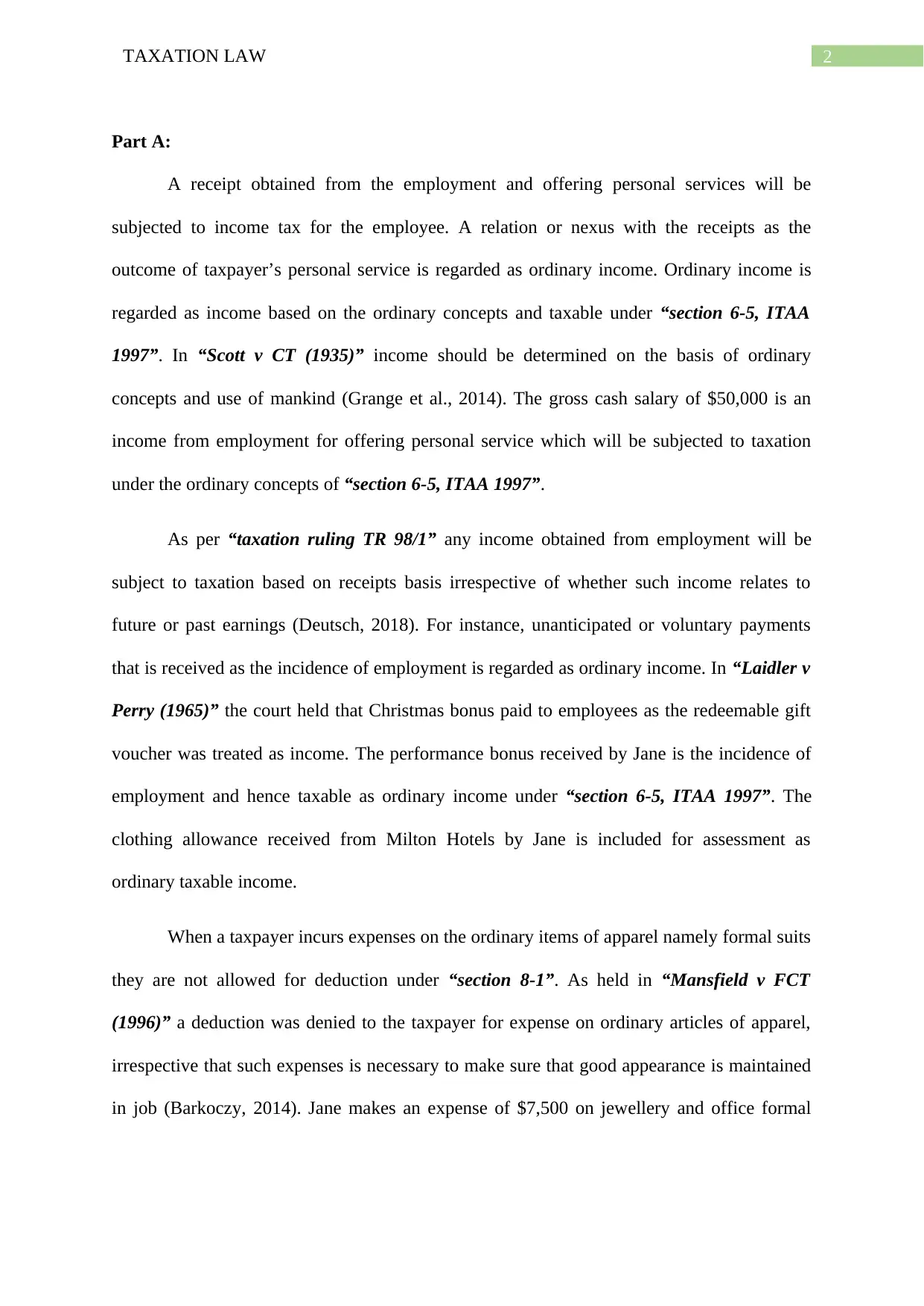
2TAXATION LAW
Part A:
A receipt obtained from the employment and offering personal services will be
subjected to income tax for the employee. A relation or nexus with the receipts as the
outcome of taxpayer’s personal service is regarded as ordinary income. Ordinary income is
regarded as income based on the ordinary concepts and taxable under “section 6-5, ITAA
1997”. In “Scott v CT (1935)” income should be determined on the basis of ordinary
concepts and use of mankind (Grange et al., 2014). The gross cash salary of $50,000 is an
income from employment for offering personal service which will be subjected to taxation
under the ordinary concepts of “section 6-5, ITAA 1997”.
As per “taxation ruling TR 98/1” any income obtained from employment will be
subject to taxation based on receipts basis irrespective of whether such income relates to
future or past earnings (Deutsch, 2018). For instance, unanticipated or voluntary payments
that is received as the incidence of employment is regarded as ordinary income. In “Laidler v
Perry (1965)” the court held that Christmas bonus paid to employees as the redeemable gift
voucher was treated as income. The performance bonus received by Jane is the incidence of
employment and hence taxable as ordinary income under “section 6-5, ITAA 1997”. The
clothing allowance received from Milton Hotels by Jane is included for assessment as
ordinary taxable income.
When a taxpayer incurs expenses on the ordinary items of apparel namely formal suits
they are not allowed for deduction under “section 8-1”. As held in “Mansfield v FCT
(1996)” a deduction was denied to the taxpayer for expense on ordinary articles of apparel,
irrespective that such expenses is necessary to make sure that good appearance is maintained
in job (Barkoczy, 2014). Jane makes an expense of $7,500 on jewellery and office formal
Part A:
A receipt obtained from the employment and offering personal services will be
subjected to income tax for the employee. A relation or nexus with the receipts as the
outcome of taxpayer’s personal service is regarded as ordinary income. Ordinary income is
regarded as income based on the ordinary concepts and taxable under “section 6-5, ITAA
1997”. In “Scott v CT (1935)” income should be determined on the basis of ordinary
concepts and use of mankind (Grange et al., 2014). The gross cash salary of $50,000 is an
income from employment for offering personal service which will be subjected to taxation
under the ordinary concepts of “section 6-5, ITAA 1997”.
As per “taxation ruling TR 98/1” any income obtained from employment will be
subject to taxation based on receipts basis irrespective of whether such income relates to
future or past earnings (Deutsch, 2018). For instance, unanticipated or voluntary payments
that is received as the incidence of employment is regarded as ordinary income. In “Laidler v
Perry (1965)” the court held that Christmas bonus paid to employees as the redeemable gift
voucher was treated as income. The performance bonus received by Jane is the incidence of
employment and hence taxable as ordinary income under “section 6-5, ITAA 1997”. The
clothing allowance received from Milton Hotels by Jane is included for assessment as
ordinary taxable income.
When a taxpayer incurs expenses on the ordinary items of apparel namely formal suits
they are not allowed for deduction under “section 8-1”. As held in “Mansfield v FCT
(1996)” a deduction was denied to the taxpayer for expense on ordinary articles of apparel,
irrespective that such expenses is necessary to make sure that good appearance is maintained
in job (Barkoczy, 2014). Jane makes an expense of $7,500 on jewellery and office formal
⊘ This is a preview!⊘
Do you want full access?
Subscribe today to unlock all pages.

Trusted by 1+ million students worldwide
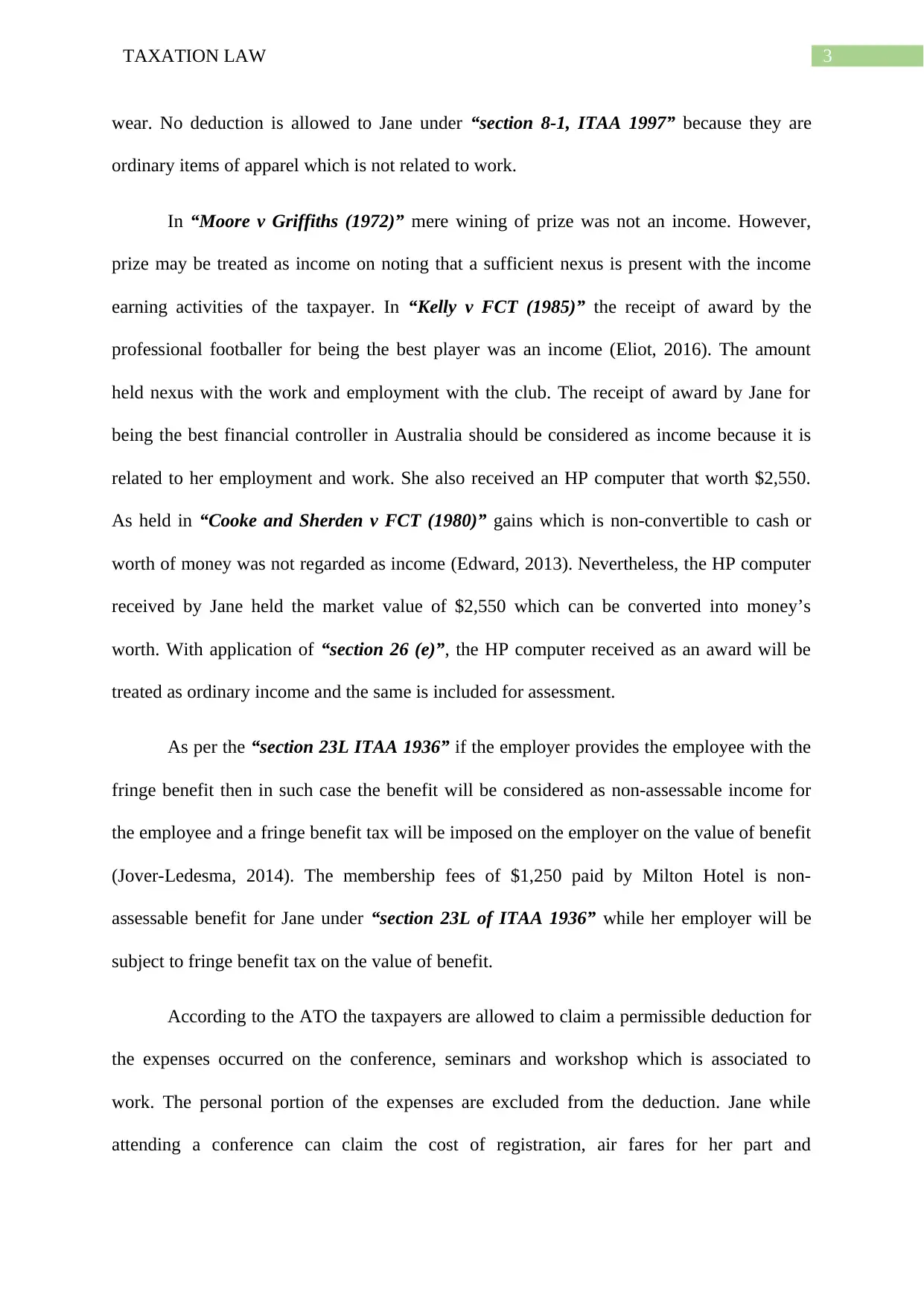
3TAXATION LAW
wear. No deduction is allowed to Jane under “section 8-1, ITAA 1997” because they are
ordinary items of apparel which is not related to work.
In “Moore v Griffiths (1972)” mere wining of prize was not an income. However,
prize may be treated as income on noting that a sufficient nexus is present with the income
earning activities of the taxpayer. In “Kelly v FCT (1985)” the receipt of award by the
professional footballer for being the best player was an income (Eliot, 2016). The amount
held nexus with the work and employment with the club. The receipt of award by Jane for
being the best financial controller in Australia should be considered as income because it is
related to her employment and work. She also received an HP computer that worth $2,550.
As held in “Cooke and Sherden v FCT (1980)” gains which is non-convertible to cash or
worth of money was not regarded as income (Edward, 2013). Nevertheless, the HP computer
received by Jane held the market value of $2,550 which can be converted into money’s
worth. With application of “section 26 (e)”, the HP computer received as an award will be
treated as ordinary income and the same is included for assessment.
As per the “section 23L ITAA 1936” if the employer provides the employee with the
fringe benefit then in such case the benefit will be considered as non-assessable income for
the employee and a fringe benefit tax will be imposed on the employer on the value of benefit
(Jover-Ledesma, 2014). The membership fees of $1,250 paid by Milton Hotel is non-
assessable benefit for Jane under “section 23L of ITAA 1936” while her employer will be
subject to fringe benefit tax on the value of benefit.
According to the ATO the taxpayers are allowed to claim a permissible deduction for
the expenses occurred on the conference, seminars and workshop which is associated to
work. The personal portion of the expenses are excluded from the deduction. Jane while
attending a conference can claim the cost of registration, air fares for her part and
wear. No deduction is allowed to Jane under “section 8-1, ITAA 1997” because they are
ordinary items of apparel which is not related to work.
In “Moore v Griffiths (1972)” mere wining of prize was not an income. However,
prize may be treated as income on noting that a sufficient nexus is present with the income
earning activities of the taxpayer. In “Kelly v FCT (1985)” the receipt of award by the
professional footballer for being the best player was an income (Eliot, 2016). The amount
held nexus with the work and employment with the club. The receipt of award by Jane for
being the best financial controller in Australia should be considered as income because it is
related to her employment and work. She also received an HP computer that worth $2,550.
As held in “Cooke and Sherden v FCT (1980)” gains which is non-convertible to cash or
worth of money was not regarded as income (Edward, 2013). Nevertheless, the HP computer
received by Jane held the market value of $2,550 which can be converted into money’s
worth. With application of “section 26 (e)”, the HP computer received as an award will be
treated as ordinary income and the same is included for assessment.
As per the “section 23L ITAA 1936” if the employer provides the employee with the
fringe benefit then in such case the benefit will be considered as non-assessable income for
the employee and a fringe benefit tax will be imposed on the employer on the value of benefit
(Jover-Ledesma, 2014). The membership fees of $1,250 paid by Milton Hotel is non-
assessable benefit for Jane under “section 23L of ITAA 1936” while her employer will be
subject to fringe benefit tax on the value of benefit.
According to the ATO the taxpayers are allowed to claim a permissible deduction for
the expenses occurred on the conference, seminars and workshop which is associated to
work. The personal portion of the expenses are excluded from the deduction. Jane while
attending a conference can claim the cost of registration, air fares for her part and
Paraphrase This Document
Need a fresh take? Get an instant paraphrase of this document with our AI Paraphraser
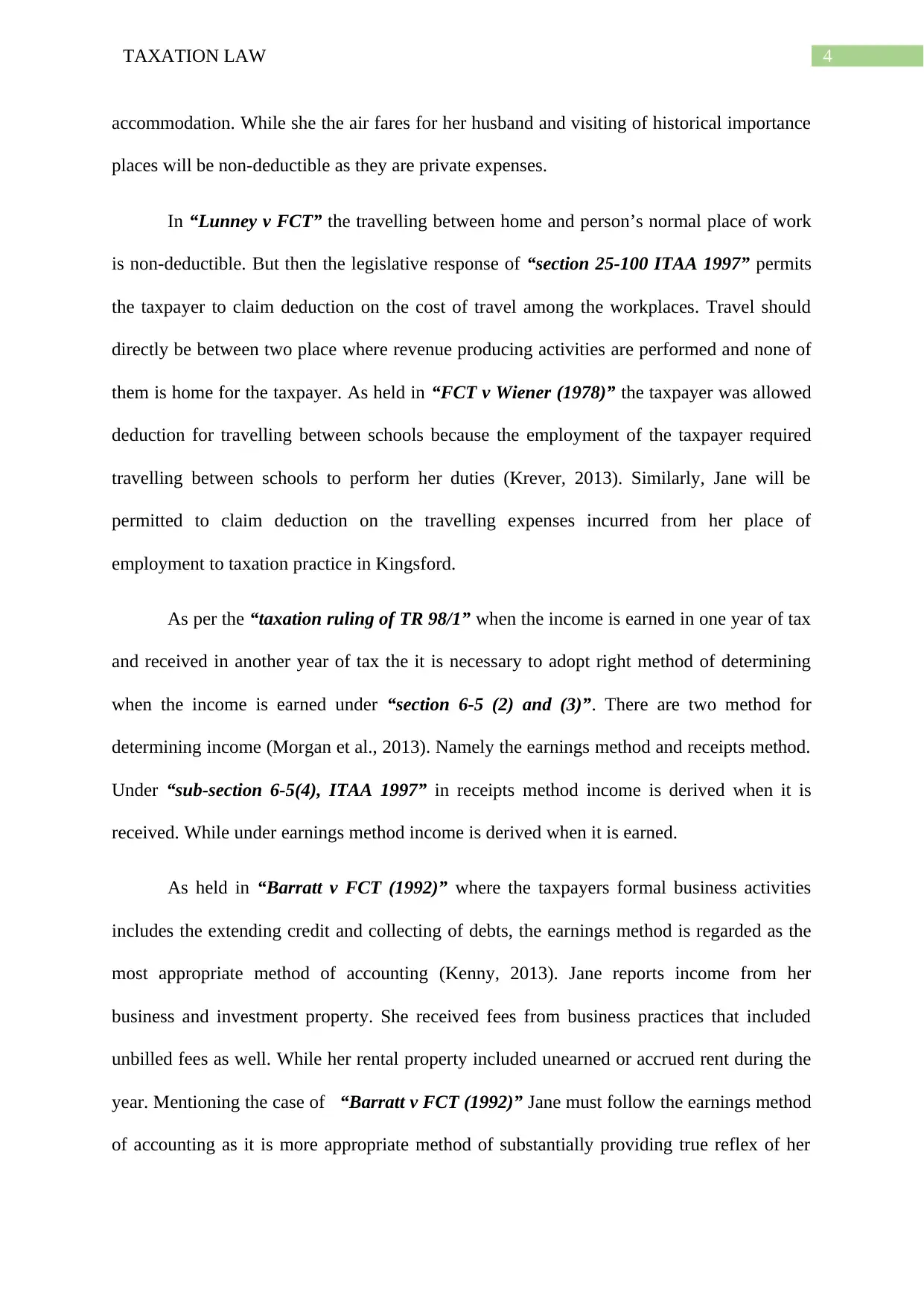
4TAXATION LAW
accommodation. While she the air fares for her husband and visiting of historical importance
places will be non-deductible as they are private expenses.
In “Lunney v FCT” the travelling between home and person’s normal place of work
is non-deductible. But then the legislative response of “section 25-100 ITAA 1997” permits
the taxpayer to claim deduction on the cost of travel among the workplaces. Travel should
directly be between two place where revenue producing activities are performed and none of
them is home for the taxpayer. As held in “FCT v Wiener (1978)” the taxpayer was allowed
deduction for travelling between schools because the employment of the taxpayer required
travelling between schools to perform her duties (Krever, 2013). Similarly, Jane will be
permitted to claim deduction on the travelling expenses incurred from her place of
employment to taxation practice in Kingsford.
As per the “taxation ruling of TR 98/1” when the income is earned in one year of tax
and received in another year of tax the it is necessary to adopt right method of determining
when the income is earned under “section 6-5 (2) and (3)”. There are two method for
determining income (Morgan et al., 2013). Namely the earnings method and receipts method.
Under “sub-section 6-5(4), ITAA 1997” in receipts method income is derived when it is
received. While under earnings method income is derived when it is earned.
As held in “Barratt v FCT (1992)” where the taxpayers formal business activities
includes the extending credit and collecting of debts, the earnings method is regarded as the
most appropriate method of accounting (Kenny, 2013). Jane reports income from her
business and investment property. She received fees from business practices that included
unbilled fees as well. While her rental property included unearned or accrued rent during the
year. Mentioning the case of “Barratt v FCT (1992)” Jane must follow the earnings method
of accounting as it is more appropriate method of substantially providing true reflex of her
accommodation. While she the air fares for her husband and visiting of historical importance
places will be non-deductible as they are private expenses.
In “Lunney v FCT” the travelling between home and person’s normal place of work
is non-deductible. But then the legislative response of “section 25-100 ITAA 1997” permits
the taxpayer to claim deduction on the cost of travel among the workplaces. Travel should
directly be between two place where revenue producing activities are performed and none of
them is home for the taxpayer. As held in “FCT v Wiener (1978)” the taxpayer was allowed
deduction for travelling between schools because the employment of the taxpayer required
travelling between schools to perform her duties (Krever, 2013). Similarly, Jane will be
permitted to claim deduction on the travelling expenses incurred from her place of
employment to taxation practice in Kingsford.
As per the “taxation ruling of TR 98/1” when the income is earned in one year of tax
and received in another year of tax the it is necessary to adopt right method of determining
when the income is earned under “section 6-5 (2) and (3)”. There are two method for
determining income (Morgan et al., 2013). Namely the earnings method and receipts method.
Under “sub-section 6-5(4), ITAA 1997” in receipts method income is derived when it is
received. While under earnings method income is derived when it is earned.
As held in “Barratt v FCT (1992)” where the taxpayers formal business activities
includes the extending credit and collecting of debts, the earnings method is regarded as the
most appropriate method of accounting (Kenny, 2013). Jane reports income from her
business and investment property. She received fees from business practices that included
unbilled fees as well. While her rental property included unearned or accrued rent during the
year. Mentioning the case of “Barratt v FCT (1992)” Jane must follow the earnings method
of accounting as it is more appropriate method of substantially providing true reflex of her
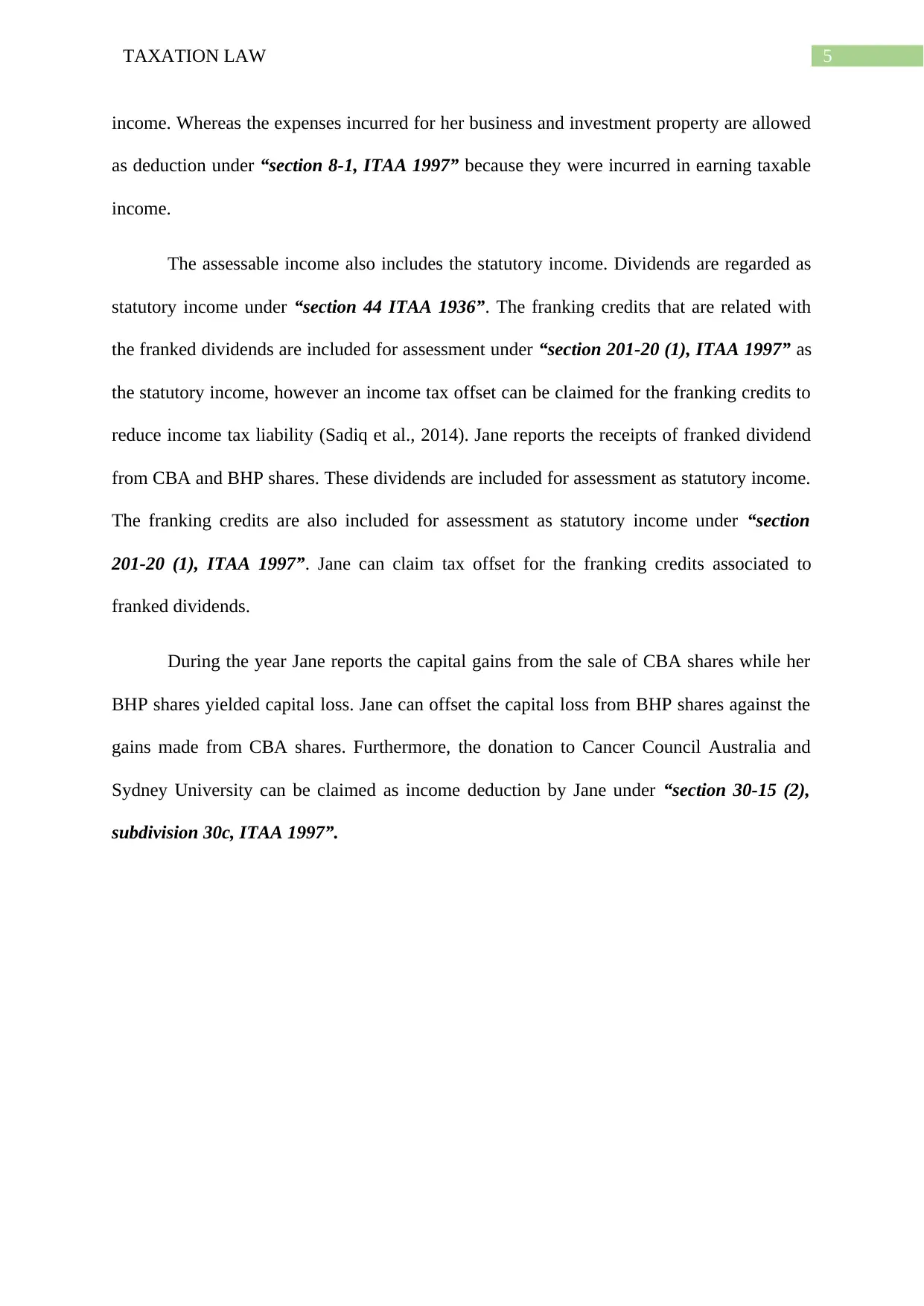
5TAXATION LAW
income. Whereas the expenses incurred for her business and investment property are allowed
as deduction under “section 8-1, ITAA 1997” because they were incurred in earning taxable
income.
The assessable income also includes the statutory income. Dividends are regarded as
statutory income under “section 44 ITAA 1936”. The franking credits that are related with
the franked dividends are included for assessment under “section 201-20 (1), ITAA 1997” as
the statutory income, however an income tax offset can be claimed for the franking credits to
reduce income tax liability (Sadiq et al., 2014). Jane reports the receipts of franked dividend
from CBA and BHP shares. These dividends are included for assessment as statutory income.
The franking credits are also included for assessment as statutory income under “section
201-20 (1), ITAA 1997”. Jane can claim tax offset for the franking credits associated to
franked dividends.
During the year Jane reports the capital gains from the sale of CBA shares while her
BHP shares yielded capital loss. Jane can offset the capital loss from BHP shares against the
gains made from CBA shares. Furthermore, the donation to Cancer Council Australia and
Sydney University can be claimed as income deduction by Jane under “section 30-15 (2),
subdivision 30c, ITAA 1997”.
income. Whereas the expenses incurred for her business and investment property are allowed
as deduction under “section 8-1, ITAA 1997” because they were incurred in earning taxable
income.
The assessable income also includes the statutory income. Dividends are regarded as
statutory income under “section 44 ITAA 1936”. The franking credits that are related with
the franked dividends are included for assessment under “section 201-20 (1), ITAA 1997” as
the statutory income, however an income tax offset can be claimed for the franking credits to
reduce income tax liability (Sadiq et al., 2014). Jane reports the receipts of franked dividend
from CBA and BHP shares. These dividends are included for assessment as statutory income.
The franking credits are also included for assessment as statutory income under “section
201-20 (1), ITAA 1997”. Jane can claim tax offset for the franking credits associated to
franked dividends.
During the year Jane reports the capital gains from the sale of CBA shares while her
BHP shares yielded capital loss. Jane can offset the capital loss from BHP shares against the
gains made from CBA shares. Furthermore, the donation to Cancer Council Australia and
Sydney University can be claimed as income deduction by Jane under “section 30-15 (2),
subdivision 30c, ITAA 1997”.
⊘ This is a preview!⊘
Do you want full access?
Subscribe today to unlock all pages.

Trusted by 1+ million students worldwide
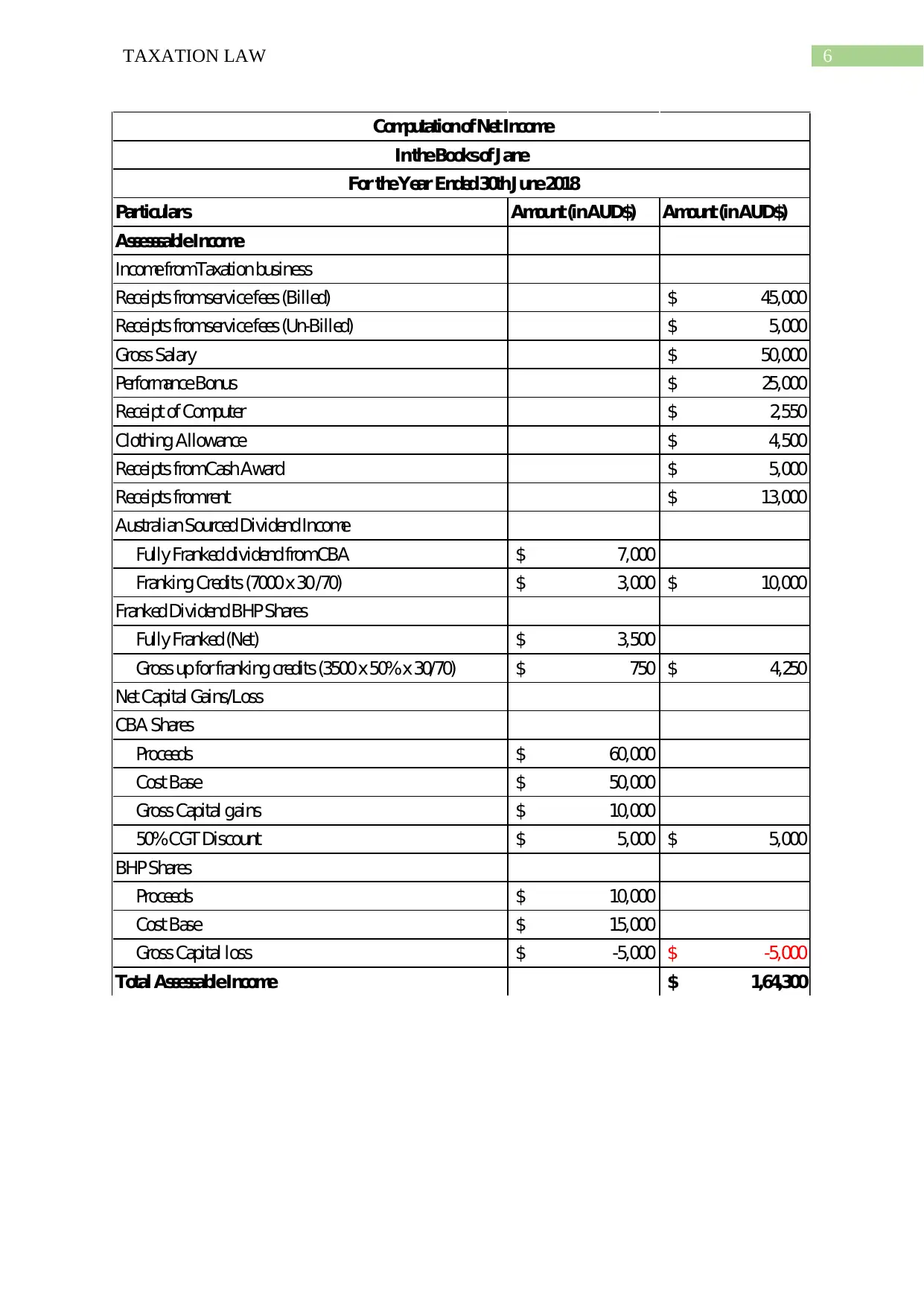
6TAXATION LAW
Particulars Amount(inAUD$) Amount(inAUD$)
AssesssableIncome
IncomefromTaxationbusiness
Receipts fromservicefees (Billed) 45,000$
Receipts fromservicefees (Un-Billed) 5,000$
Gross Salary 50,000$
PerformanceBonus 25,000$
Receipt of Computer 2,550$
Clothing Allowance 4,500$
Receipts fromCashAward 5,000$
Receipts fromrent 13,000$
AustralianSourcedDividendIncome
Fully FrankeddividendfromCBA 7,000$
Franking Credits (7000 x30/70) 3,000$ 10,000$
FrankedDividendBHP Shares
Fully Franked(Net) 3,500$
Gross upforfranking credits (3500x50%x 30/70) 750$ 4,250$
Net Capital Gains/Loss
CBA Shares
Proceeds 60,000$
Cost Base 50,000$
Gross Capital gains 10,000$
50%CGT Discount 5,000$ 5,000$
BHP Shares
Proceeds 10,000$
Cost Base 15,000$
Gross Capital loss -5,000$ -5,000$
Total AssessableIncome 1,64,300$
ComputationofNetIncome
IntheBooksofJane
For theYear Ended30thJune2018
Particulars Amount(inAUD$) Amount(inAUD$)
AssesssableIncome
IncomefromTaxationbusiness
Receipts fromservicefees (Billed) 45,000$
Receipts fromservicefees (Un-Billed) 5,000$
Gross Salary 50,000$
PerformanceBonus 25,000$
Receipt of Computer 2,550$
Clothing Allowance 4,500$
Receipts fromCashAward 5,000$
Receipts fromrent 13,000$
AustralianSourcedDividendIncome
Fully FrankeddividendfromCBA 7,000$
Franking Credits (7000 x30/70) 3,000$ 10,000$
FrankedDividendBHP Shares
Fully Franked(Net) 3,500$
Gross upforfranking credits (3500x50%x 30/70) 750$ 4,250$
Net Capital Gains/Loss
CBA Shares
Proceeds 60,000$
Cost Base 50,000$
Gross Capital gains 10,000$
50%CGT Discount 5,000$ 5,000$
BHP Shares
Proceeds 10,000$
Cost Base 15,000$
Gross Capital loss -5,000$ -5,000$
Total AssessableIncome 1,64,300$
ComputationofNetIncome
IntheBooksofJane
For theYear Ended30thJune2018
Paraphrase This Document
Need a fresh take? Get an instant paraphrase of this document with our AI Paraphraser
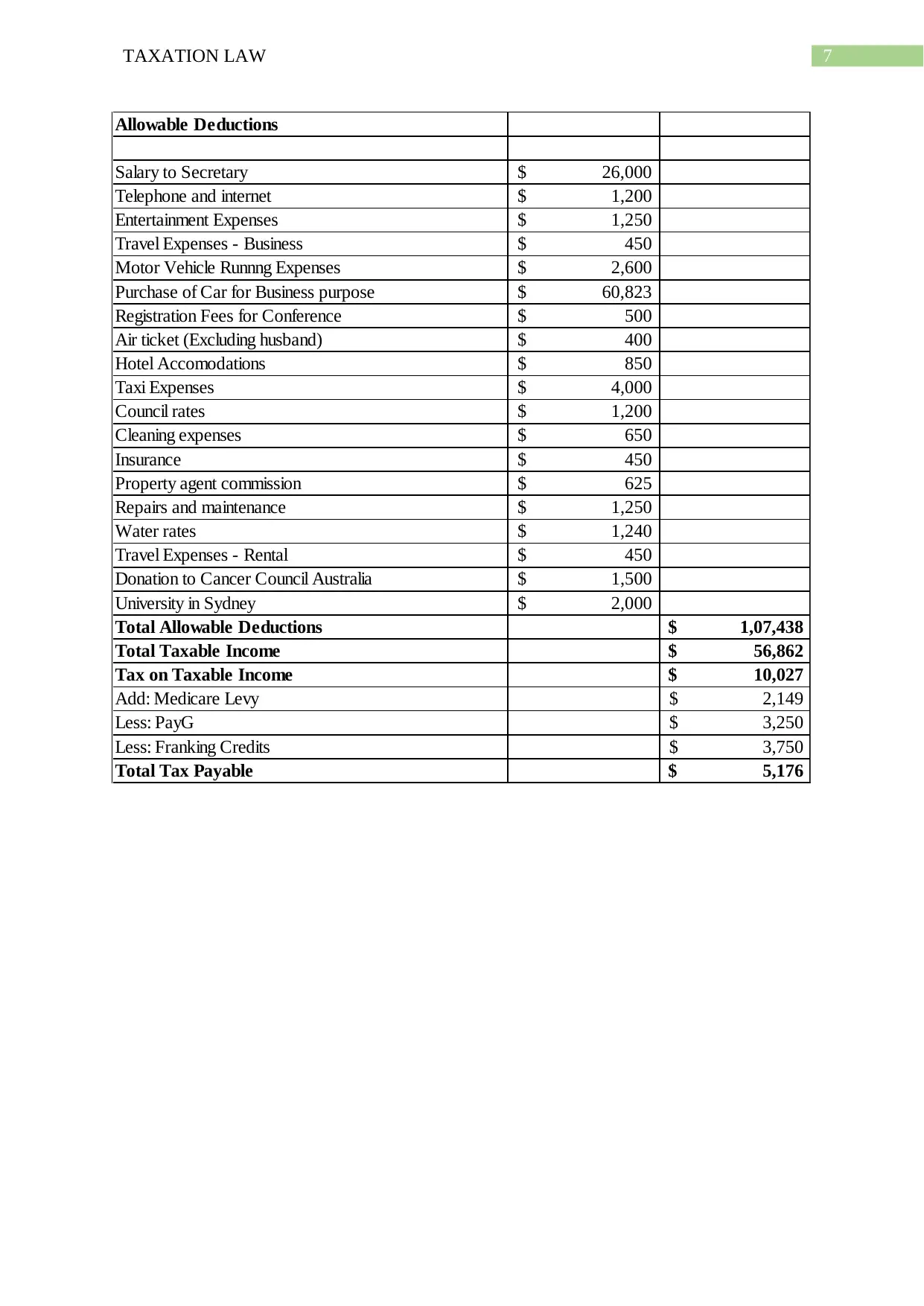
7TAXATION LAW
Allowable Deductions
Salary to Secretary 26,000$
Telephone and internet 1,200$
Entertainment Expenses 1,250$
Travel Expenses - Business 450$
Motor Vehicle Runnng Expenses 2,600$
Purchase of Car for Business purpose 60,823$
Registration Fees for Conference 500$
Air ticket (Excluding husband) 400$
Hotel Accomodations 850$
Taxi Expenses 4,000$
Council rates 1,200$
Cleaning expenses 650$
Insurance 450$
Property agent commission 625$
Repairs and maintenance 1,250$
Water rates 1,240$
Travel Expenses - Rental 450$
Donation to Cancer Council Australia 1,500$
University in Sydney 2,000$
Total Allowable Deductions 1,07,438$
Total Taxable Income 56,862$
Tax on Taxable Income 10,027$
Add: Medicare Levy 2,149$
Less: PayG 3,250$
Less: Franking Credits 3,750$
Total Tax Payable 5,176$
Allowable Deductions
Salary to Secretary 26,000$
Telephone and internet 1,200$
Entertainment Expenses 1,250$
Travel Expenses - Business 450$
Motor Vehicle Runnng Expenses 2,600$
Purchase of Car for Business purpose 60,823$
Registration Fees for Conference 500$
Air ticket (Excluding husband) 400$
Hotel Accomodations 850$
Taxi Expenses 4,000$
Council rates 1,200$
Cleaning expenses 650$
Insurance 450$
Property agent commission 625$
Repairs and maintenance 1,250$
Water rates 1,240$
Travel Expenses - Rental 450$
Donation to Cancer Council Australia 1,500$
University in Sydney 2,000$
Total Allowable Deductions 1,07,438$
Total Taxable Income 56,862$
Tax on Taxable Income 10,027$
Add: Medicare Levy 2,149$
Less: PayG 3,250$
Less: Franking Credits 3,750$
Total Tax Payable 5,176$
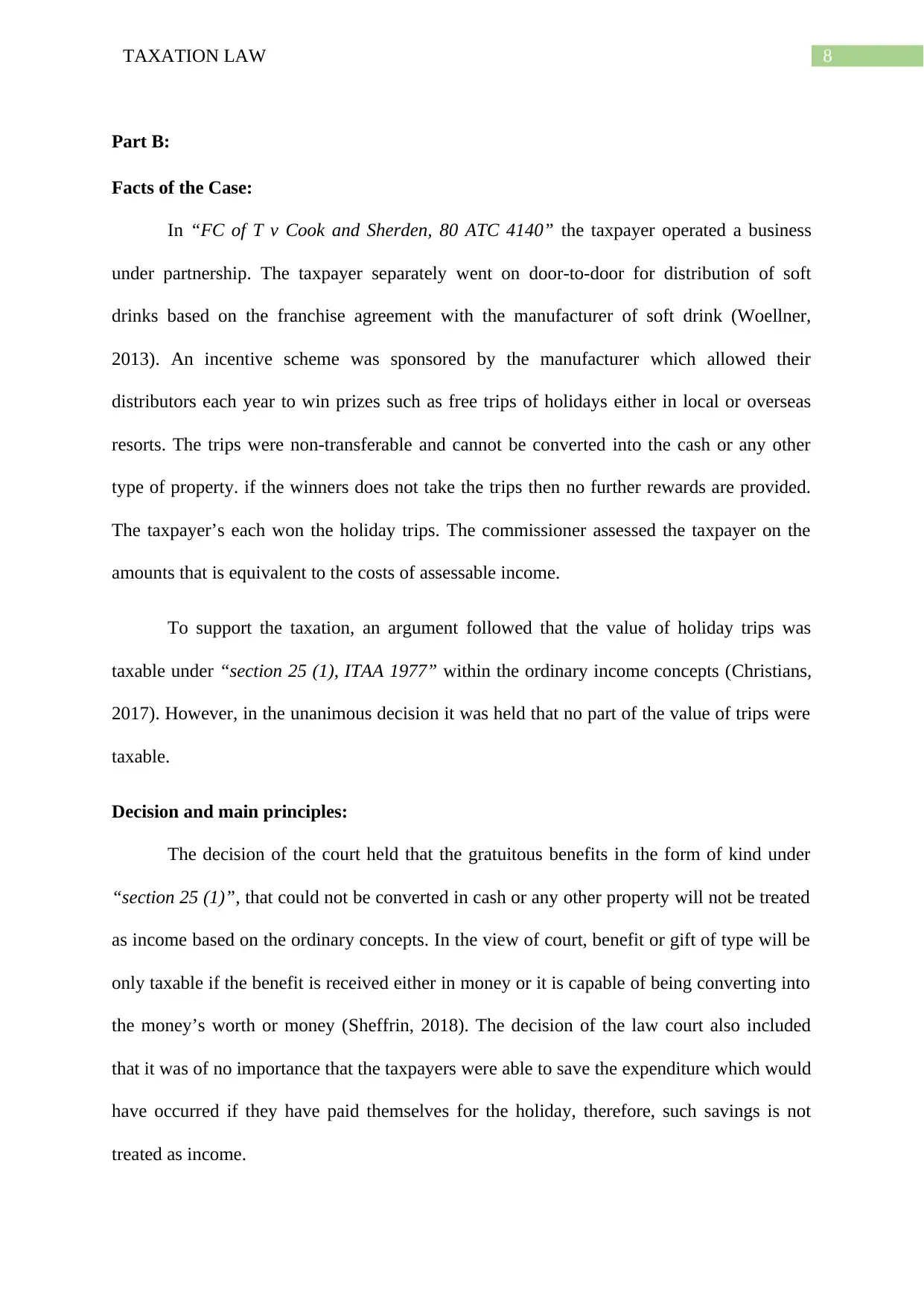
8TAXATION LAW
Part B:
Facts of the Case:
In “FC of T v Cook and Sherden, 80 ATC 4140” the taxpayer operated a business
under partnership. The taxpayer separately went on door-to-door for distribution of soft
drinks based on the franchise agreement with the manufacturer of soft drink (Woellner,
2013). An incentive scheme was sponsored by the manufacturer which allowed their
distributors each year to win prizes such as free trips of holidays either in local or overseas
resorts. The trips were non-transferable and cannot be converted into the cash or any other
type of property. if the winners does not take the trips then no further rewards are provided.
The taxpayer’s each won the holiday trips. The commissioner assessed the taxpayer on the
amounts that is equivalent to the costs of assessable income.
To support the taxation, an argument followed that the value of holiday trips was
taxable under “section 25 (1), ITAA 1977” within the ordinary income concepts (Christians,
2017). However, in the unanimous decision it was held that no part of the value of trips were
taxable.
Decision and main principles:
The decision of the court held that the gratuitous benefits in the form of kind under
“section 25 (1)”, that could not be converted in cash or any other property will not be treated
as income based on the ordinary concepts. In the view of court, benefit or gift of type will be
only taxable if the benefit is received either in money or it is capable of being converting into
the money’s worth or money (Sheffrin, 2018). The decision of the law court also included
that it was of no importance that the taxpayers were able to save the expenditure which would
have occurred if they have paid themselves for the holiday, therefore, such savings is not
treated as income.
Part B:
Facts of the Case:
In “FC of T v Cook and Sherden, 80 ATC 4140” the taxpayer operated a business
under partnership. The taxpayer separately went on door-to-door for distribution of soft
drinks based on the franchise agreement with the manufacturer of soft drink (Woellner,
2013). An incentive scheme was sponsored by the manufacturer which allowed their
distributors each year to win prizes such as free trips of holidays either in local or overseas
resorts. The trips were non-transferable and cannot be converted into the cash or any other
type of property. if the winners does not take the trips then no further rewards are provided.
The taxpayer’s each won the holiday trips. The commissioner assessed the taxpayer on the
amounts that is equivalent to the costs of assessable income.
To support the taxation, an argument followed that the value of holiday trips was
taxable under “section 25 (1), ITAA 1977” within the ordinary income concepts (Christians,
2017). However, in the unanimous decision it was held that no part of the value of trips were
taxable.
Decision and main principles:
The decision of the court held that the gratuitous benefits in the form of kind under
“section 25 (1)”, that could not be converted in cash or any other property will not be treated
as income based on the ordinary concepts. In the view of court, benefit or gift of type will be
only taxable if the benefit is received either in money or it is capable of being converting into
the money’s worth or money (Sheffrin, 2018). The decision of the law court also included
that it was of no importance that the taxpayers were able to save the expenditure which would
have occurred if they have paid themselves for the holiday, therefore, such savings is not
treated as income.
⊘ This is a preview!⊘
Do you want full access?
Subscribe today to unlock all pages.

Trusted by 1+ million students worldwide
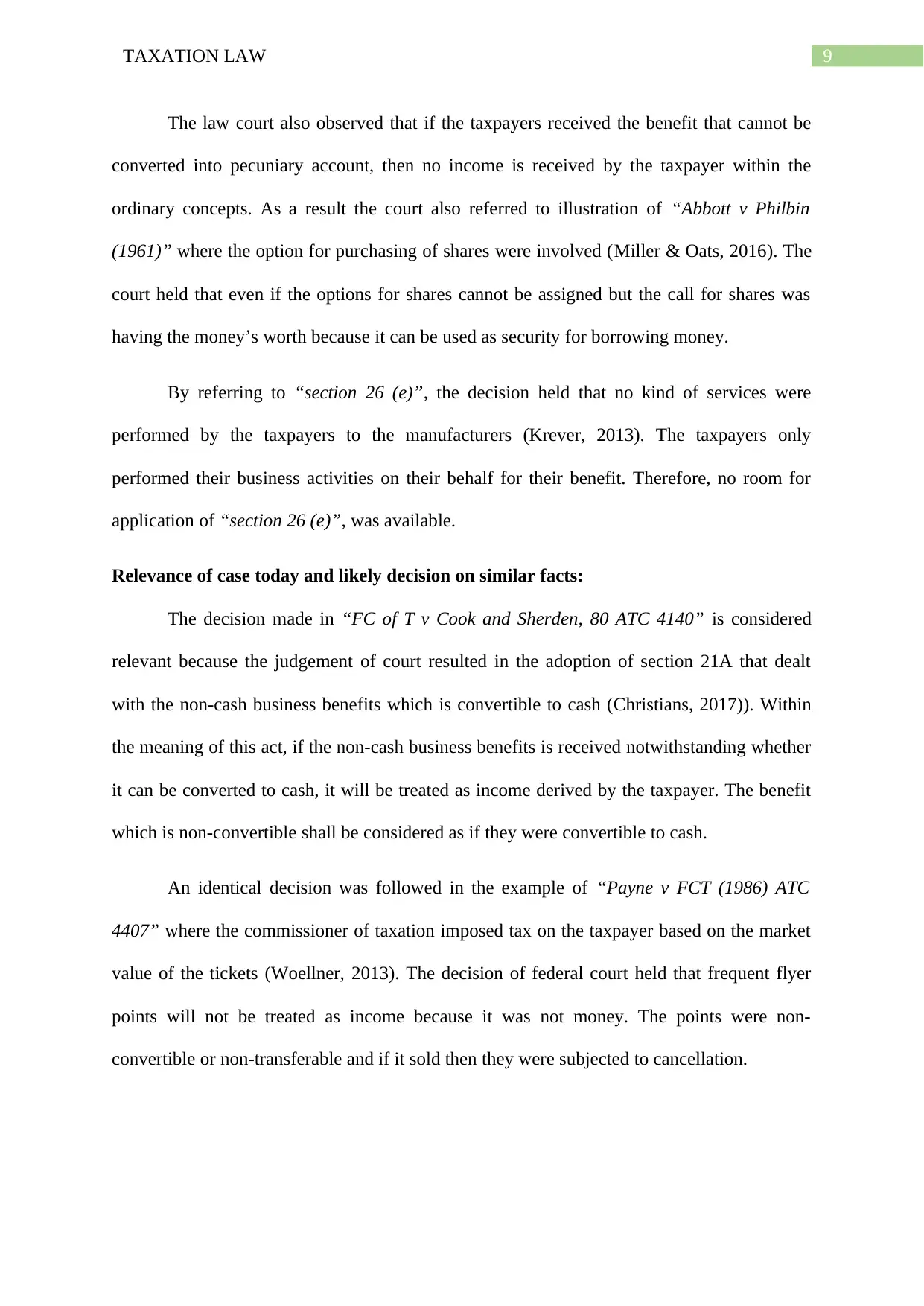
9TAXATION LAW
The law court also observed that if the taxpayers received the benefit that cannot be
converted into pecuniary account, then no income is received by the taxpayer within the
ordinary concepts. As a result the court also referred to illustration of “Abbott v Philbin
(1961)” where the option for purchasing of shares were involved (Miller & Oats, 2016). The
court held that even if the options for shares cannot be assigned but the call for shares was
having the money’s worth because it can be used as security for borrowing money.
By referring to “section 26 (e)”, the decision held that no kind of services were
performed by the taxpayers to the manufacturers (Krever, 2013). The taxpayers only
performed their business activities on their behalf for their benefit. Therefore, no room for
application of “section 26 (e)”, was available.
Relevance of case today and likely decision on similar facts:
The decision made in “FC of T v Cook and Sherden, 80 ATC 4140” is considered
relevant because the judgement of court resulted in the adoption of section 21A that dealt
with the non-cash business benefits which is convertible to cash (Christians, 2017)). Within
the meaning of this act, if the non-cash business benefits is received notwithstanding whether
it can be converted to cash, it will be treated as income derived by the taxpayer. The benefit
which is non-convertible shall be considered as if they were convertible to cash.
An identical decision was followed in the example of “Payne v FCT (1986) ATC
4407” where the commissioner of taxation imposed tax on the taxpayer based on the market
value of the tickets (Woellner, 2013). The decision of federal court held that frequent flyer
points will not be treated as income because it was not money. The points were non-
convertible or non-transferable and if it sold then they were subjected to cancellation.
The law court also observed that if the taxpayers received the benefit that cannot be
converted into pecuniary account, then no income is received by the taxpayer within the
ordinary concepts. As a result the court also referred to illustration of “Abbott v Philbin
(1961)” where the option for purchasing of shares were involved (Miller & Oats, 2016). The
court held that even if the options for shares cannot be assigned but the call for shares was
having the money’s worth because it can be used as security for borrowing money.
By referring to “section 26 (e)”, the decision held that no kind of services were
performed by the taxpayers to the manufacturers (Krever, 2013). The taxpayers only
performed their business activities on their behalf for their benefit. Therefore, no room for
application of “section 26 (e)”, was available.
Relevance of case today and likely decision on similar facts:
The decision made in “FC of T v Cook and Sherden, 80 ATC 4140” is considered
relevant because the judgement of court resulted in the adoption of section 21A that dealt
with the non-cash business benefits which is convertible to cash (Christians, 2017)). Within
the meaning of this act, if the non-cash business benefits is received notwithstanding whether
it can be converted to cash, it will be treated as income derived by the taxpayer. The benefit
which is non-convertible shall be considered as if they were convertible to cash.
An identical decision was followed in the example of “Payne v FCT (1986) ATC
4407” where the commissioner of taxation imposed tax on the taxpayer based on the market
value of the tickets (Woellner, 2013). The decision of federal court held that frequent flyer
points will not be treated as income because it was not money. The points were non-
convertible or non-transferable and if it sold then they were subjected to cancellation.
Paraphrase This Document
Need a fresh take? Get an instant paraphrase of this document with our AI Paraphraser

10TAXATION LAW
References:
Barkoczy, S. (2014). Foundations of taxation law 2014.
Christians, A. (2017). Hard Law, Soft Law, and International Taxation. Wis. Int'l LJ, 25, 325.
Deutsch, R. (2018). Australian tax handbook 2018: THOMSON REUTERS AUSTRALIA.
Edward E. (2013). Tax, law and development. Cheltenham, UK.
Eliot, G. (2016). The mill on the Floss: Open Road Integrated Media.
Grange, J., Jover-Ledesma, G., & Maydew, G. (2014). principles of business taxation.
Jover-Ledesma, G. (2014). Principles of business taxation 2015: Cch Incorporated.
Kenny, P. (2013). Australian tax 2013. Chatswood, N.S.W.: LexisNexis Butterworths.
Krever, R. (2013). Australian taxation law cases 2013. Pyrmont, N.S.W.: Thomson Reuters.
Miller, A., & Oats, L. (2016). Principles of international taxation. Bloomsbury Publishing.
Morgan, A., Mortimer, C., & Pinto, D. (2013). A practical introduction to Australian
taxation law. North Ryde [N.S.W.]: CCH Australia.
Sadiq, K., Coleman, C., Hanegbi, R., Jogarajan, S., Krever, R., Obst, W., & Ting, A. (2014).
Principles of taxation law 2014.
Sheffrin, S. M. (2018). The Domain of Desert Principles for Taxation. Erasmus Journal for
Philosophy and Economics, 11(2), 220-244.
Woellner, R. (2013). Australian taxation law 2012. North Ryde [N.S.W.]: CCH Australia.
References:
Barkoczy, S. (2014). Foundations of taxation law 2014.
Christians, A. (2017). Hard Law, Soft Law, and International Taxation. Wis. Int'l LJ, 25, 325.
Deutsch, R. (2018). Australian tax handbook 2018: THOMSON REUTERS AUSTRALIA.
Edward E. (2013). Tax, law and development. Cheltenham, UK.
Eliot, G. (2016). The mill on the Floss: Open Road Integrated Media.
Grange, J., Jover-Ledesma, G., & Maydew, G. (2014). principles of business taxation.
Jover-Ledesma, G. (2014). Principles of business taxation 2015: Cch Incorporated.
Kenny, P. (2013). Australian tax 2013. Chatswood, N.S.W.: LexisNexis Butterworths.
Krever, R. (2013). Australian taxation law cases 2013. Pyrmont, N.S.W.: Thomson Reuters.
Miller, A., & Oats, L. (2016). Principles of international taxation. Bloomsbury Publishing.
Morgan, A., Mortimer, C., & Pinto, D. (2013). A practical introduction to Australian
taxation law. North Ryde [N.S.W.]: CCH Australia.
Sadiq, K., Coleman, C., Hanegbi, R., Jogarajan, S., Krever, R., Obst, W., & Ting, A. (2014).
Principles of taxation law 2014.
Sheffrin, S. M. (2018). The Domain of Desert Principles for Taxation. Erasmus Journal for
Philosophy and Economics, 11(2), 220-244.
Woellner, R. (2013). Australian taxation law 2012. North Ryde [N.S.W.]: CCH Australia.
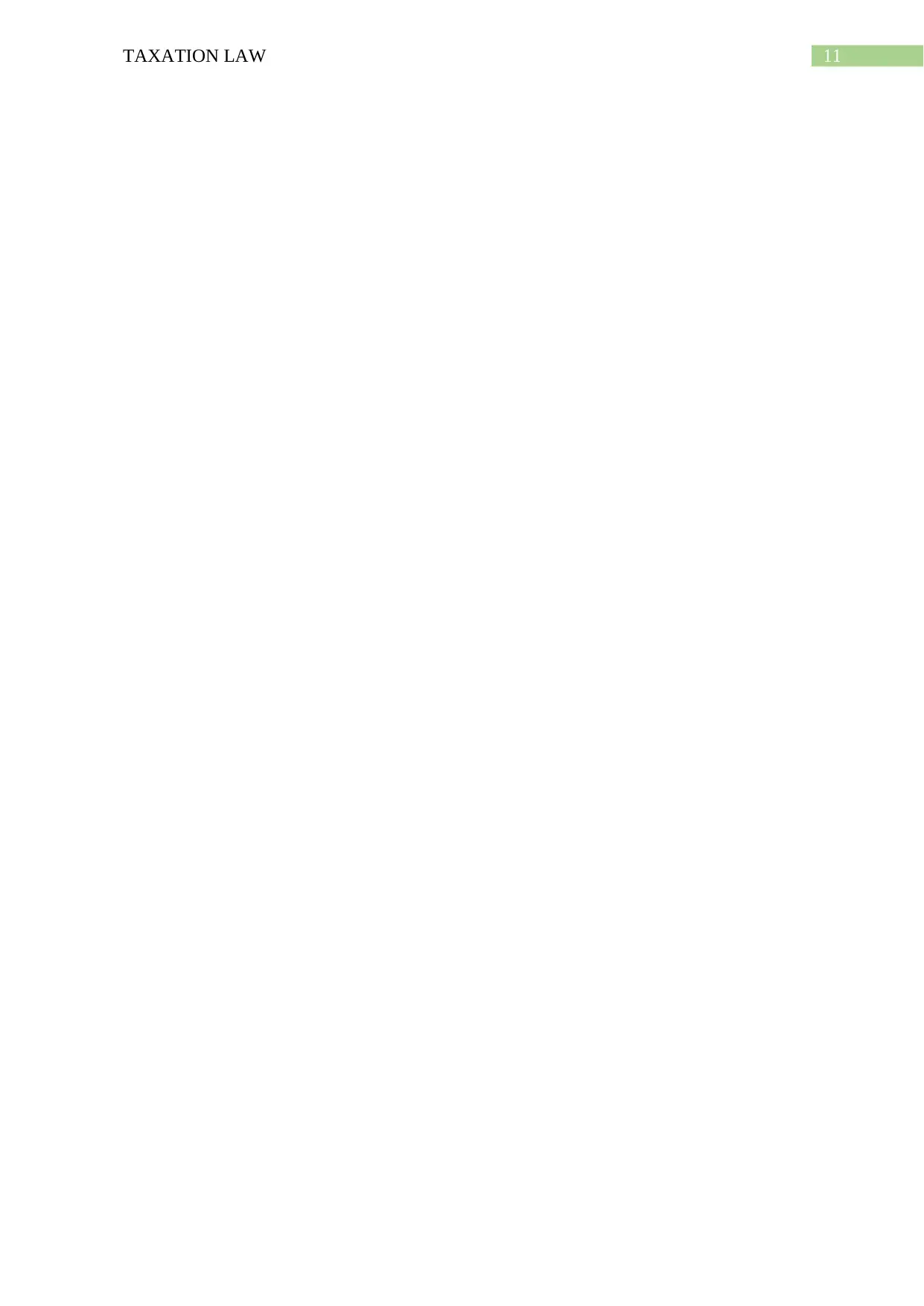
11TAXATION LAW
⊘ This is a preview!⊘
Do you want full access?
Subscribe today to unlock all pages.

Trusted by 1+ million students worldwide
1 out of 12
Related Documents
Your All-in-One AI-Powered Toolkit for Academic Success.
+13062052269
info@desklib.com
Available 24*7 on WhatsApp / Email
![[object Object]](/_next/static/media/star-bottom.7253800d.svg)
Unlock your academic potential
Copyright © 2020–2026 A2Z Services. All Rights Reserved. Developed and managed by ZUCOL.





